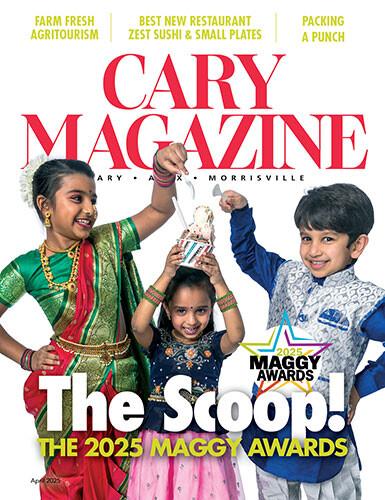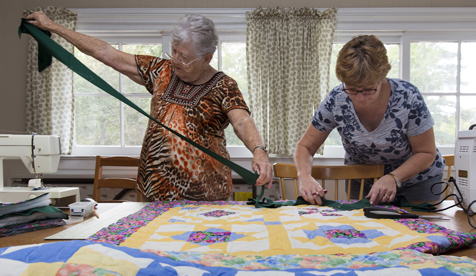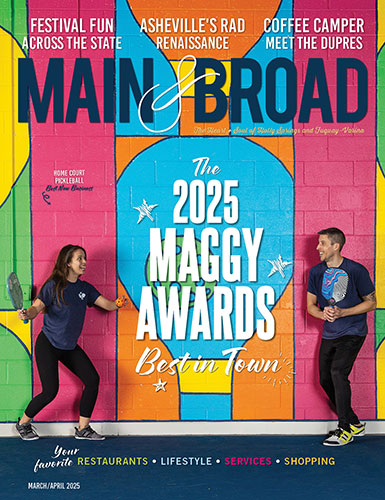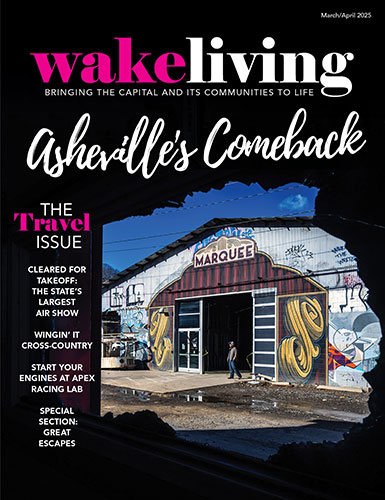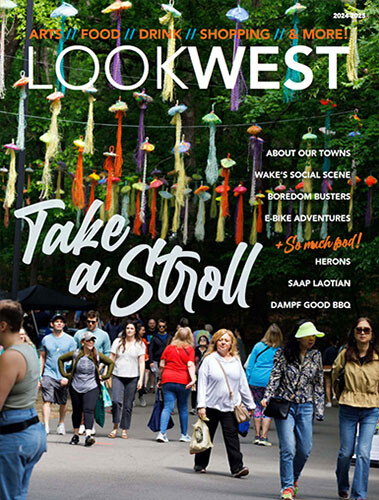Creativity, common interests pull craft fans together
In our mass-produced world, people still appreciate the handmade and the one-of-a-kind.
Even in tech-happy Western Wake, needlework crafts like knitting and quilting are gaining in popularity. And while there have always been die-hard crafters, a few common threads connect them to these new fans.
“In this world full of technology, there is this desire to hold something in your hand that someone made, or better yet, that you’ve made yourself,” said Nikki Bird, sewing manager at Downtown Knits in Apex. “People are looking for a way to be creative, to feel productive and slow down. People also want things that are unique and special to them.”

Suzanne Poe, left, and Cathy Westerhold are regulars at the weekly knit-alongs at Downtown Knits in Apex. Poe has knit for more than 10 years, but Westerhold is a relative newcomer to the craft. She took lessons at the shop two years ago and has been “obsessed ever since,” she says.
Internet Symbiosis
Although it would seem counterintuitive, local specialty store owners say they owe much of their success to the Internet.
“A huge part of the renewed popularity is because of Pinterest, do-it-yourself videos and Craftsy.com,” said Julianne Walther, owner of Cary Quilting Co. “The immediate access to ideas and tutorials online gets people excited.
“Even though Craftsy and Pinterest have the potential to take our business, I think they are doing more for our business. There are a ton of online fabric retailers, but fabric is a tactile thing. People want to touch it.”
Michele Riggs, owner of Downtown Knits, says she gets a lot of foot traffic, but Facebook and Instagram draw the most visitors. She says out-of-towners have found her shop online and registered for a class or two to take while they are in the area.

Michele Riggs, owner of Downtown Knits, left, holds a scarf that Rachel Offerdahl, right, knit from red silk blended with stainless steel. Offerdahl, of Durham, likes the Apex shop’s selection of yarn and the sense of community. “You always feel welcome,” she says.
“Our customers are not just in the neighborhood,” she said. “Our customers are worldwide.”
Rebecca Hart, owner of Warm & Fuzzy yarn shop in downtown Cary, credits much of her success to Ravelry.com, a pattern database and craft forum. The site has more than 6 million users interested in a variety of fiber arts including knitting, crocheting, weaving and spinning.
“People connect with their patterns, on forums, with yarns,” she said. “As a shop owner, I can sell patterns using the database. It is such a powerful tool. I can’t imagine running a shop without it. I owe a lot to Ravelry.”
All Sorts of Support
Potential customers may come to these specialty shops because of what they’ve seen online, but they return because of the friendly atmosphere and the customer service.
“I want the shop to be full all the time, and I don’t even care if people are buying,” said Walther. “I want it to be a place where people are laughing, talking and sharing.”
At Downtown Knits, knitters gather several times a week. Some come just to socialize; others want to consult on their projects.

Quilting enthusiast Susan Lehoullier, left, picks up some fabrice while Cary Quilting Co. employee Linda Paterni, second from right, helps Curtis Bernard and Janet Hardy with a purchase.
“We almost always have someone knitting for pleasure on our big comfy couch,” Bird said. “The regulars will help anyone who needs a hand. It’s a very friendly community. We’re excited that people are into these crafts, and everybody just wants to help.”
Crafters also meet at Warm & Fuzzy several times a week to socialize or show off their latest projects. Even when she’s not at her shop, Hart finds the same support as soon as she pulls out her knitting.
“It’s an amazing community,” she said. “I could be at a coffee shop working on something, and someone can come up to me and say: ‘What are you working on? Can I feel your yarn?’ There’s this instant community, which sounds absurd, but it’s there.”
Sustainability and Value
This desire for connection extends into the sourcing of materials. Knitters especially are seeking sustainable, organic yarns, say Bird and Hart.
“People appreciate that the fibers are organic in nature,” Bird said. “People are loving that the yarn isn’t coming from a lab somewhere. Lots of these yarns you can follow right back to their place of origin.”
Hart also notes the variety of sustainably produced, luxurious, natural fibers on the market. Small-scale farmers are raising heirloom sheep for their wool. Mills are blending wool, silk, cotton, alpaca and linen in new ways.

Left: One trend in knitting is the wide choice of fibers including brightly colored, hand-dyed yarns.
Right: Nikki Bird, sewing manager at Downtown Knits, left, chats with owner Michele Riggs, as regular customers knit together on the store’s “big comfy couch.”

Left: Employee Cindy Massey cuts fabric at Cary Quilting Co. Bold colors and geometric designs are attracting young sewers to the craft, says Julianne Walther, shop owner. “It doesn’t seem like it would fit, but it does because they are reinventing the look.”
Right: Traditional themes, such as this “Princess and the Pea” quilt hanging at Cary Quilting Co., remain popular for baby blankets or other keepsakes.
Hand-dyed, limited edition yarns are especially popular. These yarns can sell for $25 to $35 a skein, but Hart says customers are willing to pay premium prices for something unique.
“I know the people personally who have dyed the yarn,” she said. “I think people like to hear that. When someone is spending a lot of money, they want to know why. I like to think people care about the source.”
Walther says quilters also don’t mind paying for better materials. Using high-quality thread and fabric ensures that the quilt won’t fall apart after a few years, a vital consideration for a gift or keepsake.
“If you’re going to spend six months building a beautiful quilt that may be a gift for someone, you want it to reflect the time and effort you put into it,” Walther said. “And you can do that only if it’s going to stick around.”

Kim Zebrowski, center, demonstrates a technique to beginning quilters Doris Rogers, left, and Nancy Patton at Cary Quilting Co. The shop has several machines for class participants to use, so novice sewers can try the craft without making a huge investment.
Crafters don’t mind spending that time and effort, because there are few feelings better than finishing a beautiful and unique project.
Riggs sums up that feeling this way: “People want to make things they can take pride in.”
 |
 |
 |
 |
 |
 |
 |
